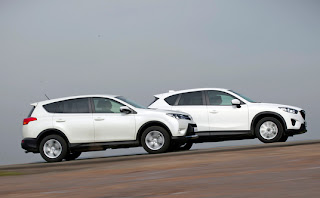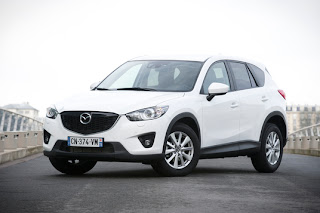 |
| Although seen from top to bottom, the Toyota RAV4 (right) has a lot to deal with a CX-5 barely older |
Both born in the land of the Rising Sun, the RAV4 and CX-5 clash with violence of suicide bombers. In the field of two-wheel drive SUV, everyone has what it takes to arguments appeal to fans of the genre. Especially the CX-5.
Lighter, less expensive, but still higher on legs and with a soft look adventurer, two-wheel drive SUVs are booming and are gradually replacing the minivan. The arrival of a new installment of the RAV4, a major leader in the category, is a small event in itself. It was high time, its predecessor is definitely more at. Unique roof to tires, the RAV4 is elongated (20 cm or 4.57 m) compared to its predecessor. The external spare wheel is now replaced by a spare wheel, stored in the boot floor, while the old back door becomes an electric tailgate opening. Although a slow process, but a real practicality and a "classy" side which deprives the CX-5. The same size, it seems a little less sophisticated. However, it has an endowment of origin also very complete. More traditional but very well done, inside Mazda is functional, equipped with many storage (like the RAV4) and well positioned, in the image of the center armrest that contains auxiliary and USB, with a small removable tray ask for your smartphone. Clean, convenient and better thought Toyota outlets, located in front of the gear lever with the wire apparent connection.
Toyota RAV4 2.0 D-4D 4x2 Life 124
Benefits
Neat and spacious interior
Large chest
Price-equipment ratio studied
Pitfalls of
Suspensions sometimes hopping
Diesel and vibrant sound
Too long braking distances
Rather clumsy frame
Mazda CX-5 SKYACTIV-D 2.2 150 4x2 Elegance
Benefits
Compromise between comfort and performance
Diesel performance and sober
Successful soundproofing
Pitfalls of
Diameter average steering
Poor braking distances
Spare unavailable
 |
| The interior of ¨ RAV4 is neat with its low dashboard dressed d ... |
 |
| Despite the benefits can not be more honest, the RAV4 ¨ must bow deva ... |
 |
| Beautiful space also at the back of ¨ CX-5, where you can enjoy a good comfort |
This is also true on the road where the SUV Mazda "removal" simply the Toyota. The latter is more clumsy, takes too roll and do not like to be rushed, otherwise trigger the slip on an early slip of the front wheels. Nothing dangerous, but significantly below your CX-5. The focus was clearly on comfort at Toyota, a good level road. But the RAV4 is sometimes hopping on the highway where, in addition, the diesel is forgotten at a steady speed (less on acceleration). In short, it is better to roll smoothly, that rush the RAV4 because then it reveals a more pleasing face and some efficiency to the point that we forget regulatory speeds. But then take the wheel of the Mazda highlights the superiority of its chassis. Precise steering, low body roll, although granted suspensions and filter out the bumps, good stability and low body movements, the CX-5 sets the bar high. Will enjoy the torque and 150 hp of the 2.2 diesel in good shape. Overtaking is done much more easily than the 124 hp of the RAV4, and again as the accelerations are incommensurate.
 |
| ¨CX-5 has a dynamism that can rival envy, while remaining ... |
No comments:
Post a Comment